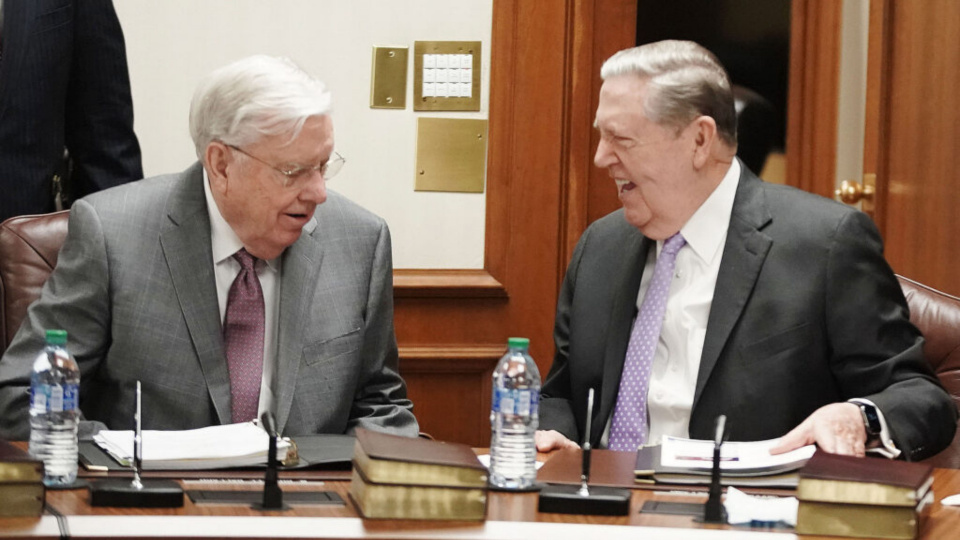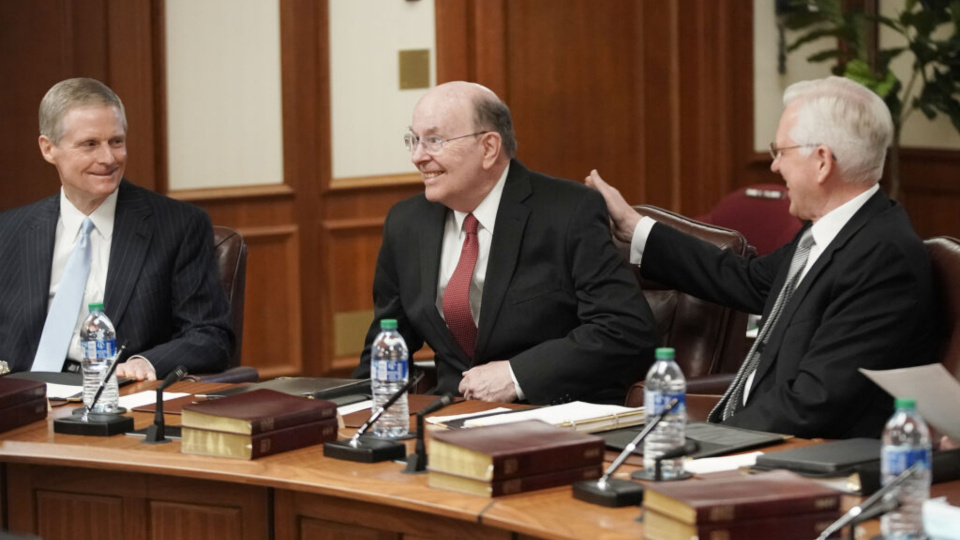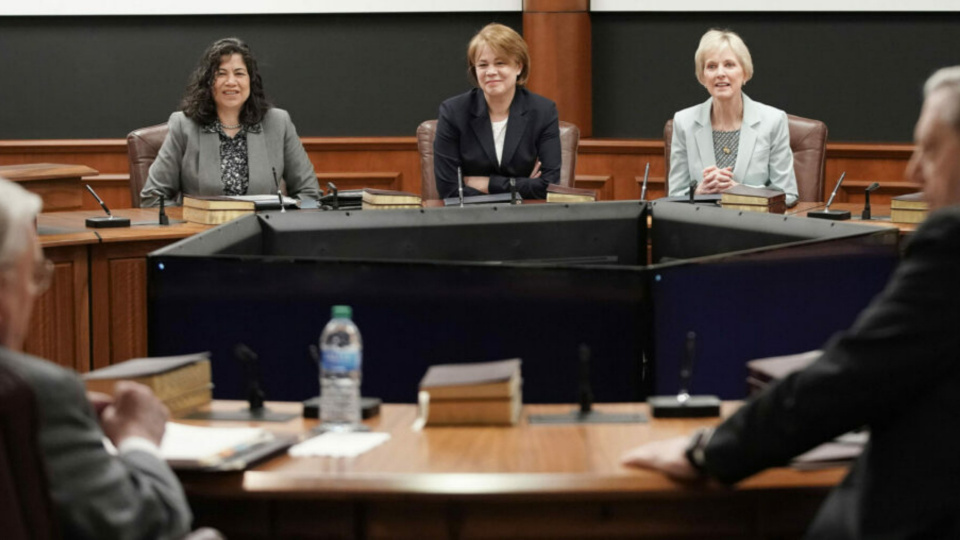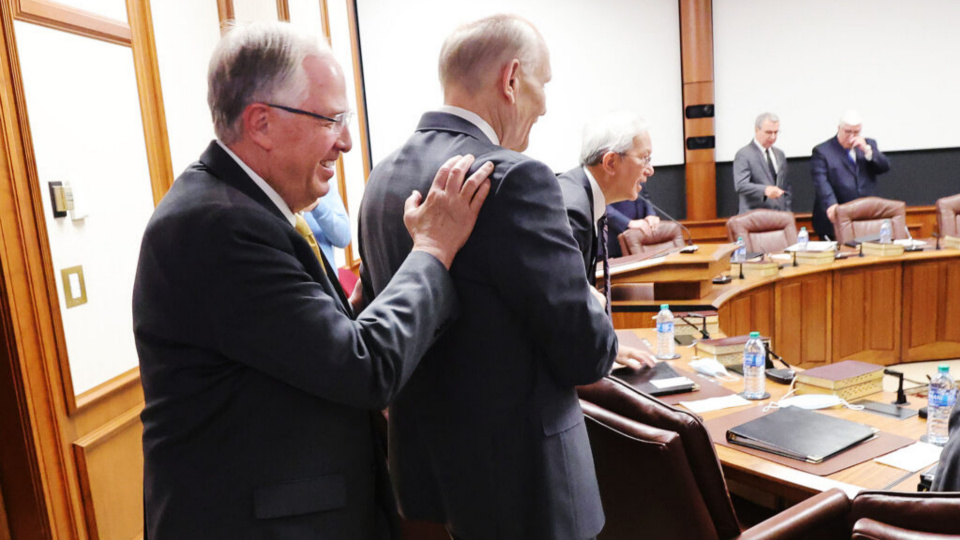- Councils-part-2
- Councils-Part-2
- Councils-part-2
- Councils-part-2
- Councils-part-2
- Councils-part-2
- Councils-part-2
- Councils-part-2
- Councils-part-2
- Councils-part-2
- Councils-part-2
- Councils-part-2
- Councils-part-2
- Councils-part-2
- Councils-part-2
- Councils-part-2
- Councils-part-2
- Councils-part-2
- Councils-part-2
| Temple Square is always beautiful in the springtime. Gardeners work to prepare the ground for General Conference. © 2012 Intellectual Reserve, Inc. All rights reserved. | 1 / 2 |
This story appears here courtesy of TheChurchNews.com. It is not for use by other media.
By Sydney Walker, Church News
Editor’s note: Part two in this four-part series on the essential role of councils in the Church gives examples from the Quorum of the Twelve Apostles about how “inviting, receiving and recognizing revelation” can happen in every council. Read more in part one, part three and part four.
From the beginning, God has done His work through organized councils, said President M. Russell Ballard, Acting President of the Quorum of the Twelve Apostles.
One of the key lessons Heavenly Father taught His children in the premortal world was the importance of councils and counseling together.
“We read that first real council story in the Pearl of Great Price,” said President Ballard, referring to the Grand Council in heaven in which Heavenly Father presented a plan for His children’s progression — a plan made possible through the willing sacrifice of Jesus Christ, who was called Jehovah.
In this family council, Heavenly Father presided with love, encouraged free expression and respected the gift of agency. During the ensuing creation of heaven and earth — as instructions were delegated and assignments were reported on — Heavenly Father and Jesus Christ demonstrated a divine pattern for counseling in councils.
Today, the Savior governs His Church through councils. This divine pattern is “critical” to the Church’s organization at every level, President Ballard said, including general, stake and ward councils. This divine pattern also applies to families.

Councils-part-2
President M. Russell Ballard and Elder Jeffrey R. Holland chat prior to the Quorum of the Twelve Apostles' weekly meeting at the Church Administration Building in Salt Lake City on Tuesday, May 11, 2021. Photo by Jeffrey D. Allred, courtesy of Church News.Copyright 2021 Deseret News Publishing Company.“I’m an advocate of the council system,” said the 92-year-old Church leader, who for decades has emphatically taught about the importance of councils. It was the subject of his October 1993 and April 1994 general conference talks, later expanded into a book titled “Counseling With Our Councils.” More recently, he emphasized family councils in the April 2016 general conference.
President Ballard, Elder Dieter F. Uchtdorf, Elder David A. Bednar and Elder Quentin L. Cook of the Quorum of the Twelve Apostles, who along with other members of the Quorum of the Twelve Apostles serve on Church executive councils, recently spoke to the Church News about the essential role of councils in the Church. They also provided insights about their experiences serving in the Council of the First Presidency and Quorum of the Twelve Apostles.
Councils Are ‘the Spiritual Safety Rail’
Jesus Christ is the head of The Church of Jesus Christ of Latter-day Saints. He has directed the creation of the First Presidency to receive revelation for the Church (see Doctrine and Covenants 124:126)
The Church is led by Melchizedek Priesthood leadership councils, President Ballard explained, with the leading governing body (or council) being the First Presidency — the Prophet, who acts as President of the Church, and two Apostles called as counselors. The Quorum of the Twelve Apostles is also a presiding council, serving the First Presidency.
When the First Presidency and the Quorum of the Twelve Apostles meet together, they form the Council of the First Presidency and Quorum of the Twelve Apostles. In this council, important decisions affecting the spiritual and temporal welfare of the Church are considered and made.
Other councils and committees are organized under the direction of the First Presidency to direct specific aspects of the work of Jesus Christ on the earth.

Councils-part-2
Elder David A. Bednar, Elder Quentin L. Cook and Elder D. Todd Christofferson greet prior to the Quorum of the Twelve Apostles' weekly meeting at the Church Administration Building in Salt Lake City on Tuesday, May 11, 2021. Photo by Jeffrey D. Allred, courtesy of Church News.Copyright 2021 Deseret News Publishing Company.President Stephen L Richards, first counselor in the First Presidency from 1951 to 1959, said: “The genius of our Church government is government through councils. I have had enough experience to know the value of councils. Hardly a day passes but that I see … God’s wisdom, in creating councils … to govern His Kingdom.” (“Strength in Council,” Ensign, November 1983).
During his career as a businessman, President Ballard managed several successful companies. “They ran because of the expertise and good work of other good people,” he said. “So it is in the Church.”
When counseling with his fellow Brethren in the Quorum of the Twelve Apostles, they discuss various aspects of an issue, reach a conclusion and make assignments for future follow-up.
“The council system is the way you move things safely and solidly from where it is to where it needs to be,” said President Ballard.
Echoing this notion of safety, Elder Bednar said: “Any one individual can make a mistake. We all make mistakes. And we have never claimed that the leaders of the Church are infallible. The council system is the spiritual safety rail.”

Councils-Part-2
From left, President M. Russell Ballard; Sister Reyna Isabel Aburto, second counselor, Sister Sharon Eubank, first counselor, and President Jean B. Bingham, all of the Relief Society general presidency; and Elder Jeffrey R. Holland attend the Leadership and Planning Committee meeting at the Church Administration Building in Salt Lake City on Tuesday, May 11, 2021. Photo by Jeffrey D. Allred, courtesy of Church News.Copyright 2021 Deseret News Publishing Company.In the Council of the First Presidency and Quorum of the Twelve Apostles, for example, all 15 leaders must reach unanimity before a decision is made.
“We can only reach an inspired conclusion as we are modest, meek and guided by the power of the Holy Ghost,” Elder Bednar said. “This council system safeguards the Church and all of the members from any one person ever trying to impose an agenda, or an issue, or a particular point of view.
“The council system is the divinely designed pattern for the safety of the Church.”
Unity, Love and Respect
Elder Uchtdorf said when sitting in council with the First Presidency and Quorum of the Twelve Apostles, “we don’t represent countries or nationalities or professions. We represent the Lord Jesus Christ and His work.”
As each member of the First Presidency and Quorum of the Twelve Apostles holds all the priesthood keys necessary for governing the Church, “that brings a unique unity and love for each other and respect for each other,” Elder Uchtdorf said. Only the President of the Church takes the lead in exercising all of those keys.
This mutual respect fosters an “equal level of discussion” — regardless of how long one has served in the council, he added.
Elder Cook said there is often “a focus and spiritual power that comes” during open discussion with members of the First Presidency and Quorum of the Twelve Apostles in a council setting.
“Suddenly everything from our history to our doctrine, the needs of the Saints, our being out in the world and meeting with the Saints all the time, comes into being. The Holy Ghost blesses us with incredibly strong impressions,” he said.

Councils-part-2
Elder Neil L. Andersen and Elder Dale G. Renlund greet prior to the Quorum of the Twelve Apostles' weekly meeting at the Church Administration Building in Salt Lake City on Tuesday, May 11, 2021. Photo by Jeffrey D. Allred, courtesy of Church News.Copyright 2021 Deseret News Publishing Company.“Then, often in prayer and other times, we have additional very strong spiritual experiences that are just very powerful and bless the effort.”
When the First Presidency and Quorum of the Twelve Apostles counsel together, Elder Bednar said, “no one ever will treat lightly a reservation or a comment by a fellow prophet, seer and revelator.”
Elder Bednar experienced this firsthand as a fairly new Apostle. During one particular meeting, an item was presented by a senior member of the Quorum of the Twelve Apostles, and Elder Bednar had reservations about the timing that was proposed.
“He said, ‘Elder Bednar, what is it about the timing that concerns you?’ And I expressed my point of view,” Elder Bednar recalled. The senior member paused. He then responded: “I have not fully considered the timing of this matter in the light you just suggested. Let’s reconsider this proposal and do some additional work.”
Elder Bednar said of this experience, “It is remarkable to be able to interact in that way with men you honor, men you admire, men you love, and who have that same regard for you.”
The power of counseling in this council and other councils in the Church is “inviting, receiving and recognizing revelation,” Elder Bednar said. Revelation is “scattered” among the various participants. Each voice matters.
“The only objective is to try to discern and apply the Lord’s will and His timing,” he said.
More About the Four-part ‘Inside Church Headquarters’ Series
Part one — President Dallin H. Oaks and President Henry B. Eyring discuss what they have learned about revelation in councils and from President Russell M. Nelson’s leadership.
Part two — President M. Russell Ballard and other members of the Quorum of the Twelve Apostles explain why the Church is governed by councils and give examples about how “inviting, receiving and recognizing revelation” can happen in every council.
Part three — Members of the Quorum of the Twelve Apostles and general women leaders give insight into the purpose and functions of three of the Church’s executive councils: the Missionary Executive Council, the Temple and Family History Executive Council and the Priesthood and Family Executive Council.
Part four — Church leaders highlight principles of counseling practiced at the general level that can help stake, ward and family councils be more effective.
Copyright 2021 Deseret News Publishing Company

